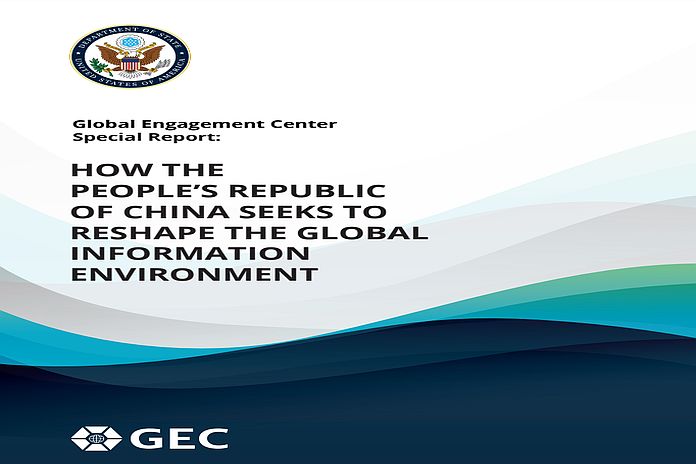By Caribbean News Global ![]()
WASHINGTON, USA – The US Department of State released a landmark report on how the People’s Republic of China, or PRC, seeks to reshape the global information environment to its advantage.
“Beijing has invested billions of dollars to construct a global information ecosystem that promotes its propaganda and facilitates censorship and the spread of disinformation. While formidable, the PRC’s efforts have faced setbacks in democratic countries, due in large part to resistance from local media and civil society,” said the office of the spokesperson, US Department of State.
The report finds that the PRC’s information manipulation efforts feature five primary elements: leveraging propaganda and censorship, promoting digital authoritarianism, exploiting international organizations and bilateral partnerships, pairing co-optation and pressure, and exercising control over Chinese-language media. These five elements enable Beijing to bend the global information environment to its advantage. If successful, the PRC’s efforts could transform the global information landscape, creating biases and gaps that lead nations to make decisions that subordinate their economic and security interests to Beijing’s.
Global impacts of PRC information manipulation
The PRC is gaining overt and covert influence over content and platforms:
- China Central Television, a state outlet, provides free video footage and television scripts to 1,700 foreign news organizations and media groups. In many cases, content produced by PRC official media is repackaged for local outlets without branding that would identify it as coming from a foreign government.
- To work around Thai laws limiting foreign media ownership, one of the PRC’s leading technology companies created a local subsidiary run by Thai nationals to purchase Thailand’s most popular news site with 30 million active monthly users.
- The PRC has become a leading provider of digital television services in Africa through StarTimes. By controlling cable TV service providers, the PRC gains the power to determine which stations viewers can access by excluding Western news channels from basic packages.
- As of 2021, almost 100 influencers disseminated official PRC messaging in at least two dozen languages on multiple social media platforms to a combined audience of over 11 million followers in dozens of countries.
The PRC is constraining global freedom of expression:
- Over 1,000 pro-PRC accounts sought to bury a report by the Spain-based nongovernmental organization Safeguard Defenders detailing the presence and activities of 100 “overseas police service stations” in 53 countries linked to local PRC public security authorities across multiple jurisdictions.
- In September 2021, Lithuania’s National Cyber Security Centre reported that phones manufactured by PRC corporation Xiaomi had a default capability to censor a list of at least 449 phrases. This “feature” was inactive in phones shipped to Europe according to the Lithuanian report but could be activated remotely.
- Beijing uses WeChat and WeiXin – applications popular among Chinese speakers globally and within the PRC – to censor overseas discussions. Communications between registered WeChat users outside the PRC feed through “pervasive” surveillance that directly improves the PRC’s domestic censorship capabilities by teaching WeiXin to recognize sensitive content more quickly.
- In September 2019, Huawei’s French subsidiary filed a defamation suit, which it ultimately withdrew in July 2022, against a French researcher and the talk show that hosted her after she said that Huawei was “under the control of the State and the” due to the presence of a CCP committee within the company.
The PRC is promoting an emerging community of digital authoritarians:
- The PRC exports digital ecosystems like “smart” or “safe” cities to assist in surveillance. As of June 2021, 163 global smart city-public security projects involved PRC firms that have operations in Xinjiang.
- As of 2019, PRC information controls had spread to 102 countries. In 11 of these countries, the deepest diffusion of PRC information control tactics resulted in imitation, or outright replication, of PRC information control laws and techniques.
- With assistance from Beijing, foreign governments have used Huawei systems worth hundreds of millions of dollars to support police work and even to intercept the electronic communications and cellular location data of domestic political opposition members.
- In November 2021, at least 18 countries used Huawei-manufactured middleboxes, which facilitate and inspect internet traffic on some online networks, to block access to certain sites.
- TikTok’s owner ByteDance seeks to block potential critics of Beijing, possibly including those outside the PRC, from using its platforms. As of late 2020, ByteDance maintained a regularly updated internal list identifying people who were likely blocked or restricted from all ByteDance platforms, including TikTok.
Executive summary
Every country should have the ability to tell its story to the world. However, a nation’s narrative should be based on facts and rise and fall on its own merits. The PRC employs a variety of deceptive and coercive methods as it attempts to influence the international information environment. Beijing’s information manipulation spans the use of propaganda, disinformation, and censorship. Unchecked, the PRC’s efforts will reshape the global information landscape, creating biases and gaps that could even lead nations to make decisions that subordinate their economic and security interests to Beijing’s.





